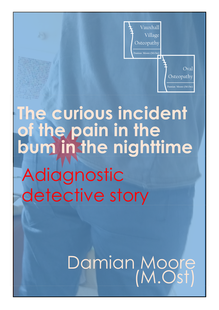The curious incident of the pain in the bum in the night time - a diagnostic detective story24/10/2017  I thought you might like an example of the thought processes I go through to determine what needs treatment to resolve somebody's pain or dysfunction. This is the story of someone in their mid forties with no known underlying health issues who woke up one morning after a night in bed asleep and alone, with severe pain in their bottom region. The pain was and is enough to make them yelp during certain movements, it really hurts!..I know this because this patient is me and the morning was yesterday. Yesterday I woke and immediately felt it, lying in bed; a sharp pain in my...was it my coccyx? When I got out of bed I yelped because it hurt so much. OK, so the coccyx doesn't usually become painful for no apparent reason. Had there been a fall, or other trauma to the area? No trauma, in fact I'd had a lazy day the day before (Sunday) and spent most of it on the sofa. I had been decorating and been out dancing the day before but had no pain following that. No trauma, doesn't sound like coccyx. Do you have a history of problems with the coccyx? No Or pelvis? I hurt my left sacroiliac joint 9 months ago, actually it ached a bit in bed and I had a bit of sciatica a couple of nights last week. Do you have any sciatica now? No! It was just a couple of nights last week. OK. So what movements and positions hurt now? Lying in bed, sitting and walking hurt, but standing is OK. Actually sitting is OKish, it is standing from sitting that really hurts, that's when I yelp. Coughing sneezing and going to the toilet are pretty yelp inducing too. But there are no issues with being able to go to the toilet? Only braving the discomfort Does anything make it better? Ibuprofen You said lying in bed was bad, can you get comfortable to sleep? If I lie on my right side with my left leg forward I am comfortable but I tend to move in the night and then the pain wakes me. I had to get up at 4am for an ibuprofen last night So the pain wakes you at night? You've not had any night-sweats, unexplained weight loss, nausea or change in appetite, constant fatigue, blood in urine or difficulty peeing, have you? No OK, lets have a look at you. Now bear in mind I can't see myself from the back but I can't feel any puffiness and my low back doesn't feel affected so my suspicion is there is little visible asymmetry. None of the joints of the lumbar spine are tender to palpate and neither are either of the sacroiliac joints. The sacrococcygeal joint, however is very tender on both the left and right side. The coccyx itself isn't. Lets try some movements Well obviously rising from sitting hurts. Surprisingly though rotation right is the most painful spinal movement, actually bending forward and straightening from that doesn't hurt much. Right hip no pain on any movements but left hurts at full extension (moving leg back) and a bit on internal rotation of hip. I can only test these actively on my own, so using muscles, but on a patient I would then test the painful movements taking the joint through the range of motion with the body relaxed, so if it still hurt I would know it isn't muscles. In this case I know it isn't muscles because it hurts sitting and lying still. For a little while I was a bit stumped as to how the sacrococcygeal joint became so painful during the night, without trauma but i think the evidence above is enough for a pretty good hypothesis. We can be pretty sure it is the sacrococcygeal joint that is generating the pain. pressing on it hurts and releasing pressure on it, when standing from sitting, also really hurts (it isn't about the movement in this instance as standing from bending over is the same movement but doesn't hurt). Pain that awakens someone in the night and comes on for no apparent reason are a couple of red flags and can, in the presence of other symptoms or signs suggest that further investigation is required to ensure that, for example, there isn't metastatic bone cancer. In this case there are no night sweats, weight loss, fatigue, nausea or appetite change, all possible indicators of cancer and no difficulty peeing or blood in urine, perhaps specifically indicative of prostate cancer, the most likely cancer in men to spread to the lower spine. The pain is also movement related and that is a very strong indicator that it is musculoskeletal and mechanical. It is also responsive to ibuprofen, suggesting the process is, at least in part inflammatory. The saccrococcygeal joint is subject to anatomical variation. It can contain a disc, which can herniate, bulge or 'slip' but more likely may just be a simple synovial joint, or even may be ossified. Again red flags appear with difficulty going to the toilet, are nerves being compromised by a bulging disc?..Not in this case, it is just painful but there are no difficulties openoing or closing the valves, so to speak. The most common cause of pain at this joint is irritation of the soft tissues around the joint, ligaments, capsule etc...and what irritates those? Being stretched. How does that happen? Either the coccyx is held uncomfortably, or the sacrum is. We know that there has been no trauma to the coccyx and that it usually takes one for it to move, so that leaves the sacrum. The sacrum is a vaguely triangular bone which has joints with the coccyx at the bottom, L5 (the bottom lumbar vertebra) at the top and the ilium part of the innominate bones (main pelvic bones) at the sides. None of the other joints are painful but the history tells us that there has been a problem in the past with the left sacroiliac joint and that there may have been some recent disorder there, so it would make sense to think about whether that was likely implicated. Pain is worst (apart from when pressure is released) when the left leg is back (hip extended) and relieved when lying in bed with the left leg forward, it also hurts when lying on my back, where the weight of my leg is forcing the leg straight. If you've read the sacroiliac joint series in this blog you'll know that the evidence suggests the joint doesn't move much unless certain conditions are met, however my mechanism of injury 9 months ago opened the joint and rotated the left innominate posteriorly relative to the sacrum, which would have the potential to be in the category of those rare occassions when the joint actually does move out of alignment. It doesn't have to have moved much, but either not having fully resolved it at the time, or (perhaps having weakened ligaments when I hurt it last time) repeating the injury enough to move it a little but not to cause pain in the joint itself could lead to my sacrum being twisted between the innominates...and most importantly relative to the coccyx. bringing my leg back and even lying all night with it flat against the bed would increase that twist. So this is my best guess but all diagnosis is exactly that...a best guess. Phrases such as, 'we'll do a scan to make sure' give a false sense of certainty. A person may have a disc bulge at the right level but it may be asymptomatic and the pain may be driven by another structure. Certainly the orthopaedic tests we do have limited specificity and sensitivity and on their own can only form a small part of the picture, but when combined with the palpatory findings, anatomical knowledge and experience informing our perception of the likelihood of each scenario and most importantly the patient's history of this and previous ailments we can build a good picture and a reasonable diagnosis.
1 Comment
|
Archives
February 2024
AuthorDamian is the principal osteopath at Vauxhall Village Osteopathy and Oval Osteopathy Categories
All
|


 RSS Feed
RSS Feed


